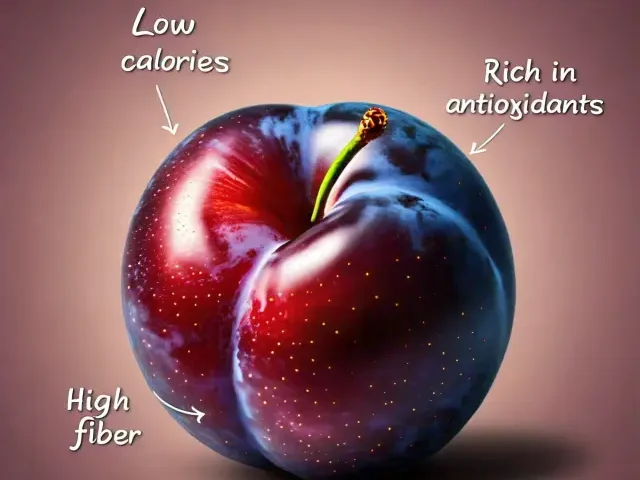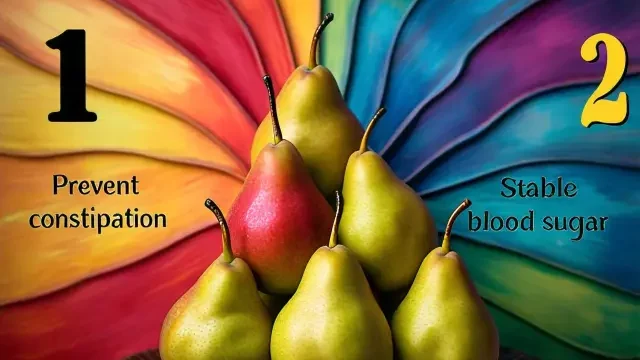Weight Loss in Monsoon Wellhealthorganic : Monsoon is a much-anticipated season in India, bringing relief from the intense summer heat. However, the weather in monsoon also triggers cravings for fried snacks and sugary treats, making our weight management a bit challenging.
Fortunately, nature offers a solution: a variety of monsoon fruits that not only satisfy your taste buds but also support your weight loss goals.
These fruits are packed with nutrients, low in calories, and can help keep those extra pounds at bay.
Here are six monsoon fruits that can be your allies in maintaining a healthy weight.
1. Peaches :

Peaches are a juicy delight perfect for the monsoon season. They are low in calories and high in fiber, helping you feel full for longer periods and reducing overall calorie intake. Peaches also contain bioactive compounds that may boost metabolism and prevent obesity.
Nutrition Highlight: Rich in vitamins A and C, peaches support immune function and skin health, adding to their weight loss benefits.
Wellhealthorganic Wellhealth Ayurvedic Health Tips To Lose Weight Fast
2. Plums

Plums offer a unique blend of tartness and sweetness, making them a satisfying low-calorie snack. They are rich in antioxidants, which help combat inflammation, a key factor in obesity and metabolic syndrome.
Nutrition Highlight: Plums are a good source of fiber, aiding digestion and promoting a feeling of fullness.
3. Pears

Pears are another monsoon favorite, known for their high fiber content. This helps regulate the digestive system, prevent constipation, and promote satiety, which is crucial for weight management.
Nutrition Highlight: Pears have a low glycemic index, helping maintain stable blood sugar levels and reducing hunger spikes.
4. Jamun (Indian Blackberry)

Jamun is a staple of the monsoon season with its distinctive sweet and sour flavor. It is low in calories but high in fiber, making it an excellent snack for weight loss. Jamun also possesses antidiabetic properties, helping control blood sugar levels.
Nutrition Highlight: The fruit Jamun is rich in antioxidants, particularly anthocyanins, which support heart health and may aid in weight loss.
5. Cherries

Cherries are not only delicious but also beneficial for a weight loss diet. Their high water content keeps you hydrated and full, reducing overall calorie intake. Cherries are also known for their anti-inflammatory properties and can help reduce post-exercise soreness.
Nutrition Highlight: Containing melatonin, cherries can improve sleep quality, which is crucial for weight management.
6. Papaya

Papaya is a nutrient-rich monsoon fruit that supports weight loss. Its enzyme, papain, aids in digestion, breaking down food more efficiently and preventing bloating.
Nutrition Highlight: Papaya is low in calories and high in water content, helping control hunger and reducing the likelihood of overeating.
Conclusion: Well Health Tips
Well Health Tips Wellhealthorganic: Incorporating these monsoon fruits into your diet can help you navigate the challenges of weight loss during the rainy season. These fruits not only provide essential nutrients and antioxidants but also their high fiber and water contents aid in digestion, reduce hunger, and support overall health. Enjoy these fruits as part of a balanced diet, combined with regular physical activity, to achieve and maintain your weight loss goals.
Remember, while fruits are beneficial for weight loss, they should be consumed as part of a varied diet. Moderation is key, as is combining dietary efforts with consistent exercise, even during the monsoon season. Here’s to a healthier, lighter you, rain or shine!
FAQs on Weight Loss with Monsoon Fruits: Well Health Tips
1. Can eating fruits alone help me lose weight during the monsoon?
Fruits are nutritious and can aid in weight loss due to their fiber and water content. However, relying solely on fruits is not recommended for weight loss. A balanced diet that includes vegetables, lean proteins, and whole grains is essential for proper nutrition and effective weight loss. Moreover, physical activity plays a crucial role in achieving weight loss goals. Research suggests that eating fruits alone may not be sufficient for weight loss during the monsoon, but incorporating a variety of fruits as part of an energy-restricted diet can be beneficial (Crujeiras et al., 2006; Oliveira et al., 2008).
2. How much fruit should I eat daily to lose weight?
The general recommendation is to consume at least 2 servings of fruit per day. Portion control is key, as fruits contain natural sugars. Balancing fruit intake with other nutrients and considering total calorie intake are important for weight loss. Consuming fruits like berries and apples/pears, which have been associated with weight loss, can be beneficial when included as part of a balanced diet (Bertoia et al., 2014).
3. Are there any fruits I should avoid if I’m trying to lose weight?
Most fruits, when eaten in moderation, fit into a weight loss diet. However, it is wise to consume higher-calorie or higher-sugar fruits, like bananas and grapes, in moderation. Focus on a variety of fruits to get a range of nutrients. Research highlights that a balanced diet that includes a variety of fruits and vegetables, rather than avoiding specific fruits, is more beneficial for weight loss (Stadlmayr et al., 2023).
4. Can monsoon fruits help curb my cravings for unhealthy snacks?
Yes, the natural sweetness and fiber in fruits can satisfy cravings for sugary snacks by providing a healthier alternative that also helps you feel fuller longer. Including fruits like peaches or cherries in your diet can help manage sweet cravings. Monsoon fruits can provide the necessary nutrients while helping to avoid unhealthy snacking habits (Kelly Parker, 2022).
5. How can I incorporate more fruits into my diet during the monsoon?
You can add fruits to your diet in several ways:
- As a fresh snack between meals.
- Blended into smoothies.
- Added to salads for a sweet and tangy flavor.
- As a natural dessert option.
Incorporating a variety of fruits into your meals can enhance your diet and provide essential nutrients (Greger, 2020).
6. Are canned or dried fruits just as good for weight loss?
Fresh fruits are generally the best option for weight loss due to their higher water content and lower calorie density. Canned fruits can be a good alternative if they’re in water or natural juice, not syrup. Dried fruits are more calorie-dense, so they should be eaten in smaller quantities. It is essential to check labels for added sugars and preservatives when consuming canned or dried fruits (Banerjee et al., 2021).
7. Do monsoon fruits have any side effects I should be aware of?
For most people, consuming monsoon fruits as part of a balanced diet doesn’t have adverse effects. However, if you have allergies, diabetes, or any other health conditions, it’s best to consult with a healthcare professional about which fruits are safe for you. Some individuals may need to avoid certain fruits due to their sugar content or potential allergic reactions (Greger, 2020).
8. How do monsoon fruits fit into a low-carb or keto diet?
Fruits contain natural sugars and carbs, so if you’re on a strict low-carb or keto diet, you’ll need to limit your fruit intake. Choose lower-carb options like berries in moderation. Always consult with a dietitian to fit fruits into your specific diet plan effectively (Bertoia et al., 2014).
Enjoyed this article? Read our other articles!
Explore more topics and gain deeper insights by checking out our other articles: Well Health Tips
Further Reads:
- Intake of hot water after each meal as a weight reduction strategy
- Effect of Varying Diet Intensities on Weight Loss Intervention
- Nutrition and High Altitude Exposure
Stay informed and empowered with our latest updates!


[…] Don’t Miss Reading: Weight Loss Tips in Monsoon […]